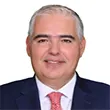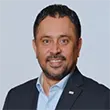The General Affairs Committee is led by Vice President and Honorary Secretary, Mr. René Piil Pedersen, and supported by Vice President and Honorary Treasurer, Ms. Katie Men. The Committee oversees all matters relating to the Association’s public relations, collaterals, social activities, and the Secretariat’s administrative affairs.
The Secretariat, headed by Executive Director Mr. Loh Chun How since November 2024, is supported by a dedicated team of staff members who deliver comprehensive administrative and support services to the membership body. The team also continues to provide secretariat support to the Federation of ASEAN Shipowners’ Association (FASA) and the Safe Navigation and Environment Committee (SNEC) of the Asian Shipowners’ Association (ASA).
Key Achievements
29th Annual General Meeting
The 29th Annual General Meeting and Cocktail Reception were successfully held on 27 June 2024, welcoming over 190 member companies and more than 520 participants. The event provided a valuable platform for members to connect and review SSA’s progress and future plans.
39th Anniversary Gala Dinner
The Annual Gala Dinner, held on 15 November 2024, was attended by over 2,400 SSA members and guests. The occasion was graced by Mr. Murali Pillai, Minister of State for Law and Transportation, alongside distinguished ambassadors and foreign representatives from Japan, Denmark, and Norway.
Maritime Conversations@SSA Series
Building on the success of the knowledge seminar series launched in 2023, SSA hosted 10 Maritime Conversations @ SSA events during the year. The seminar on 18 April 2024 explored the feasibility of ammonia as a sustainable fuel, addressing bunkering challenges and crew training. Subsequent sessions covered topics such as maritime finance pricing, digital bunkering, global regulatory updates, and digitalisation trends. These events continue to provide members with critical insights as the industry navigates the twin challenges of decarbonisation and digital transformation.
Educational Talks, Webinars and Workshops
The Secretariat facilitated a series of online talks and webinars, expanding the reach of expert knowledge on niche maritime topics. Key sessions included discussions on maritime security, sanctions and compliance, sustainable fuel solutions, and managing publications onboard ships. Notably, the webinar held on 24 January 2025, titled Navigating the Red Sea, provided in-depth analysis of maritime security risks amid ongoing geopolitical uncertainties.
In partnership with RSM SG Assurance and the Tripartite Alliance for Fair and Progressive Employment Practices (TAFEP), we organised a seminar to discuss the new Flexible Work Arrangements (FWA) Guidelines effective from 1 December 2024 that drew over 100 HR practitioners. A panel of maritime industry leaders shared insights on implementing FWA in the 24/7 shipping environment, highlighting the importance of mutual trust, clear communication, and progressive management support.
Maintaining Strong Relations at Home and Abroad
SSA remains a respected collective voice representing Singapore’s shipping community locally, regionally, and internationally. Regionally, SSA continues to lead the Federation of ASEAN Shipowners’ Association (FASA), with Executive Director Mr. Loh Chun How serving as Secretary General. SSA President Ms Caroline Yang chaired the Safe Navigation and Environment Committee (SNEC) meeting during the 34th Asian Shipowners Association AGM, where discussions focused on geopolitical risks, including the Red Sea situation and its impact on commercial shipping. The SNEC continues to champion efforts to promote pollution-free marine environments and ensure safe navigation.
Locally, SSA maintains robust partnerships with key government agencies such as the Maritime and Port Authority of Singapore, Singapore Customs, the Immigration and Checkpoints Authority, the Republic of Singapore Navy, and the Police Coast Guard. The Association also holds influential roles on advisory and working committees across various statutory bodies.
Maritime Talent Development
SSA continued its commitment to nurturing maritime talent through the MaritimeONE Scholarship Programme, awarding scholarships to five deserving students during the 2024/2025 fiscal year, with total support amounting to $162,000. Administered by the Singapore Maritime Foundation, the programme aims to strengthen the maritime talent pipeline by assisting students requiring financial aid.
In addition, SSA actively participates in academic advisory boards at the Nanyang Technological University, National University of Singapore, ITE, and Singapore Polytechnic. The Secretariat also continues to facilitate internship placements, providing practical exposure to maritime students.
Corporate Social Responsibility
The SSA Young Executives Group (YEG) organised multiple community initiatives throughout the year. Highlights included participation in the annual Pink Ribbon Walk to raise breast cancer awareness and an environmental awareness event on the impact of plastic pollution.
Conclusion

Managing Director
A.P. Moller Singapore Pte Ltd
The General Affairs Committee remains committed to supporting the Singapore Shipping Association’s mission of fostering a vibrant, resilient, and forward-looking maritime community. Through a diverse range of initiatives—from engaging member events and knowledge-sharing platforms to talent development and corporate social responsibility—the Committee continues to strengthen the bonds within the industry while addressing emerging challenges. Looking ahead, we will maintain our focus on enhancing member engagement, promoting sustainable practices, and nurturing the next generation of maritime professionals, ensuring that SSA remains a pivotal force in advancing Singapore’s position as a leading global maritime hub.
Singapore’s maritime sector is a cornerstone of its economy, contributing significantly to global trade. However, the industry faces mounting pressure to reduce its carbon footprint and align with international sustainability goals. The SSA Decarbonisation Committee was established to support this shift, focusing on promoting sustainable energy, safety, and environmental practices within Singapore’s port waters. It comprises key stakeholders, including the Singapore Association of Ship Suppliers and Services (SASS), harbour craft operators and MPA representatives. The committee aims to identify and address barriers to decarbonisation in the maritime sector, foster collaboration among industry stakeholders, regulators, and financiers, develop actionable strategies to accelerate the adoption of green technologies, and ensure Singapore’s maritime sector remains competitive while meeting environmental goals.
Key Achievements
These are the Decarbonisation Committee’s key achievements over the last fiscal year.
Port Decarbonisation Report Submission
The committee submitted a comprehensive report to MPA with strategic recommendations focusing on workforce upskilling, vessel age limits, funding mechanisms to de-risk green investments, innovative commercial models as well as public-private partnerships. The report was a culmination of discussions among members based on the Maritime Singapore Decarbonisation Blueprint 2050 previously published in 2022.
Awareness and Industry Engagement
The committee actively promoted awareness of decarbonisation issues through knowledge-sharing initiatives such as the inaugural Decarbonisation Forum held on 30 October 2024. The event highlighted Singapore's ambitious goal of achieving a fully electric, biofuel-capable harbour craft fleet by 2030 while providing valuable insights into energy pathways, standards development, workforce training, financial modelling, and support programmes for industry players.
In addition, the Maritime Conversations@SSA dived into discussions surrounding carbon tax policies, biofuels adoption, and transitional regulatory framework. These efforts helped to drive greater awareness and stakeholder alignment on decarbonisation priorities.
Challenges and Solutions
A shortage of skilled personnel to address cyber threats and evolving regulations remains a significant barrier to decarbonisation. Strengthening the capabilities of small and medium enterprises (SMEs) through cost-effective training, workforce development, and international partnerships is essential. Leveraging overseas expertise and collaborating with global experts ensures SMEs stay ahead of technological advancements and effectively integrate emerging technologies.
High upfront costs and uncertain returns often deter shipowners from adopting green technologies. Robust financial incentives—such as tax breaks, subsidies, and low-interest loans, as well as carbon trading or offset schemes—can make investments in decarbonisation more attractive. Market-driven trials of electric harbour craft and asset management models can further encourage competition, cost-efficiency, and private investment.
Additional adoption challenges include stakeholder resistance, operational uncertainties, and the need to balance short-term profitability with long-term sustainability. Uncertainties around alternative fuels, inconsistent global regulations, and high retrofitting costs add further complexity. To this end, technology-neutral grants, or credits for retrofitting vessels with low-carbon technologies, age limits for vessels, and phased decommissioning strategies for older ships can help accelerate the transition. Financial rewards for early retirement or retrofitting initiatives also provide strong incentives.
Facilitating access to global best practices and promoting cross-industry partnerships through innovation hubs can further support SMEs. By bringing together shipping companies, equipment manufacturers, research institutions, and regulators, these hubs foster collaboration on sustainable technologies and processes, driving both sustainability and competitiveness across the sector.
Conclusion

Chief Executive Officer
Cyan Renewables Pte Ltd
The Decarbonisation Committee remains committed to steering the maritime sector towards a sustainable and competitive port future. Through robust industry engagement and proactive policy advocacy, the committee has contributed meaningfully to driving Singapore’s maritime sustainability roadmap. The contributions from our members and stakeholders have been instrumental in achieving key milestones and laying the foundation for a practical transition for a low-carbon maritime future.
The SSA Digitalisation Committee aims to accelerate digitalisation in Singapore’s maritime sector, by fostering collaboration among the industry, government agencies and technology providers. The committee’s key focus is to empower small and medium-sized enterprises (SMEs) to contribute to Singapore’s position as a future-ready maritime hub.
Maritime Singapore’s competitiveness increasingly depends on SMEs embracing digital solutions to enhance efficiency, resilience, and sustainability. Robust cybersecurity is essential to protect maritime assets and infrastructure from evolving cyber threats, ensuring secure trade flows, and maintaining Singapore’s reputation as a trusted maritime centre. Meanwhile, artificial intelligence is playing an expanding role in boosting industry competitiveness by optimising operations and enabling smarter decision-making.
Key Achievements
Launch of Vessel Cybersecurity Scorecard
The Committee collaborated closely with cybersecurity partners to develop and launch a user-friendly MaritimeSG Shipping CyberSafe Scorecard, an online self-assessment tool designed specifically for the shipping industry. This portal enables ship owners to evaluate their cybersecurity posture by providing actionable insights and benchmarking against industry standards. Leveraging the well-established NIST Cybersecurity Framework, the scorecard helps companies identify vulnerabilities, strengthen digital defences, and meet increasingly stringent compliance requirements. To promote widespread adoption, the Committee has forged strategic partnerships with key industry players including North Standard, Class NK, Inmarsat, and Bureau Veritas. Thus far, 35 companies have onboarded the portal.
SME Digitalisation Programme
A SME-focused training programme was rolled out this year, in partnership with PwC. The first in the series was a digital roadmap masterclass, with two runs successfully concluded. Maritime businesses were able to identify gaps in their digital capabilities, prioritise key initiatives, and confidently embark on their digital transformation journeys.
Developing a Shore Cybersecurity Scorecard for SMEs
The Committee developed a user-friendly Cybersecurity Scorecard tailored for SSA members’ shore operations, specifically designed to assist SMEs in assessing their cybersecurity readiness. The scorecard provides a clear checklist of essential cybersecurity hygiene practices, helping members understand the fundamental defences that every SME should have in place to safeguard their operations.
Engaging the Maritime Cyber Assurance and Operations Centre
The Committee actively supported the operationalisation of MPA’s Maritime Cyber Assurance and Operations Centre (MCAOC), a vital infrastructure that strengthens Singapore’s maritime cyber resilience. MCAOC delivers real-time cybersecurity monitoring, early-warning alerts, and best-practice guidance, which members can tap on to detect and respond swiftly to emerging cyber threats in a cost-effective manner.
2nd edition of SSA Tech-novate Day
SSA Tech-novate Day aims to convene technology providers, shipowners, regulators, and startups to showcase innovative solutions and foster collaboration. The 2nd edition this year focused on applications of Artificial Intelligence (AI) technologies in the maritime industry. Guest presenters provided tangible ideas for businesses looking to take the next step in their digitalisation roadmap. One example is how shipowners can utilise Generative AI to improve the generation and processing of contracts more quickly and accurately.
Challenges and Solutions
During the reporting period, the Committee tackled several key challenges hindering the acceleration of digitalisation within the maritime industry. A primary obstacle was the wide disparity in digital readiness across the sector, especially among SMEs. To address this, the Committee developed structured programmes to equip SMEs with the skills and resources necessary to confidently embark on their digital transformation journeys.
Cybersecurity also emerged as a significant concern. As digital adoption increased, so did exposure to cyber risks, leading to hesitancy among stakeholders. The Committee responded by championing cybersecurity awareness through targeted workshops, policy dialogues, and initiatives such as the Cybersecurity Scorecard to help both ship and shore operations strengthen their defences.
The Committee emphasised the urgent need for talent and skills development. It advocated for stronger partnerships with educational institutions and training providers to support relevant programmes, while working towards integrating digital literacy into maritime certification frameworks.
With the rapid rise of AI presenting new opportunities for the industry, the Committee established a dedicated workgroup to develop a comprehensive strategy that promotes AI adoption among SSA members, ensuring that the sector remains at the forefront of technological innovation.
Conclusion

Advisor, Pacific International Lines Pte Ltd
The Digitalisation Committee has made strides in advancing digital transformation across Singapore’s maritime community by creating the necessary awareness and cultivating a vibrant culture of innovation, collaboration, and continuous learning throughout the sector. As digitalisation continues to reshape global shipping, the Committee remains dedicated to equipping members with practical tools, fostering strong partnerships, and providing digitalisation thought leadership to drive the maritime sector forward.
The International Committee is dedicated to addressing key challenges within the global shipping industry and contributing towards shaping international shipping policy. By leveraging technical expertise, cross-sector partnerships, and engagement with policymakers, the Committee drives regulatory alignment and mitigates operational disruptions. The Committee’s work is further supported by the Tax Sub-Work Group, which focuses on fiscal innovation and policy advocacy.
Key Achievements
Advancing Decarbonisation Regulatory Compliance
The Committee supported members in navigating the complexities of the EU Emissions Trading System (ETS) and FuelEU Maritime regulations by organising topical knowledge sharing sessions. It also shared insights on MEPC 83 outcomes, China’s decarbonisation roadmap, safe ammonia, and methanol bunkering frameworks, as well as the Zero Emission Shipping Fund.
Mitigating Security and Geopolitical Risks
In response to piracy and security threats, especially in the Red Sea and Gulf of Aden, the Committee developed Interim Transit Guidelines and facilitated expert briefings on sanctioned “dark fleet” vessels. We also advocated for harmonised sanctions enforcement and shared best practices from international legal frameworks.
Navigating Trade and Competition Policies
The Committee submitted recommendations to the U.S. Trade Representative and Singapore’s Competition and Consumer Commission on the renewal of the Block Exemption Order that serves to safeguard liner shipping agreements. Additionally, we participated in the Johor-Singapore Special Economic Zone survey to streamline maritime logistics. Collaboration with the International Chamber of Shipping (ICS) addressed regional port policy challenges, such as those in Bangladesh.
Participating in Labour Legal Reforms
The Committee provided feedback on amendments to the Maritime Labour Convention (MLC) and reviewed Canada’s Shipping Conferences Exemption Act, contributing to the modernisation of seafarer protections and antitrust exemptions.
Contributing to Tax & Fiscal Innovation
Working with the MPA, the Tax Work Group contributed to discussions on Singapore’s 2024 Alternative Tonnage Tax Regime as well as lobbying efforts on the OECD BEPS Pillar 2 framework. Members participated in a poll on the 2025 budget, providing the industry’s feedback on fiscal policy.
Challenges and Solutions
One of the foremost challenges facing the industry is the volatility of international regulations, particularly in environmental policy. The swift pace of changes related to the IMO Greenhouse Gas (GHG) Strategy, the European Union Emissions Trading System (EU ETS), and FuelEU Maritime regulations demands agile adaptation from industry players. To support members in meeting these compliance pressures, the Committee has provided timely technical briefings and comprehensive regulatory summaries.
Geopolitical tensions and security disruptions also pose serious risks. The rise in piracy and other security threats in high-risk regions such as the Red Sea requires continuous vigilance and rapid response. By facilitating real-time advisories and collaborating with security experts on up-to-date guidance, the Committee helps ensure members safeguard their vessels and operations amid volatile conditions.
Structural and regional challenges further complicate the operating environment. For example, issues surrounding business compliance in Bangladesh highlighted jurisdictional limitations and underscored the need for national-level reforms. While the Committee actively advocated for change through partnerships and ongoing dialogue, we recognise that some systemic problems extend beyond our direct influence and require broader governmental action.
Navigating the increasingly complex global tax and fiscal environment is another ongoing challenge. The Tax Work Group has been providing regular industry feedback to policy makers, such as Singapore’s Alternative Tonnage Tax. These efforts aim to ensure competitive fiscal frameworks that support the maritime sector’s growth while aligning with international standards.
Conclusion

Executive Vice President, Marketing & Commercial
Ocean Network Express Pte Ltd

Head of Strategy and Growth
Sinoca Shipping Agency Pte Ltd
The International Committee has demonstrated adaptability in addressing the challenges posed by rapidly changing regulations and emerging security threats. By prioritising knowledge sharing, expert engagement, and timely policy updates, the Committee has equipped members to navigate regulatory changes and operational risks effectively. Our collaborative efforts on regional and global issues have also strengthened the maritime sector’s capacity for sustainable growth and resilience.
The SSA Legal and Insurance Committee serves as a key forum for members to discuss emerging legal developments, insurance challenges, and compliance requirements, ensuring that Singapore maintains its status as a trusted and resilient maritime hub. The Committee focused on several critical areas this fiscal year, including the implications of the European Union Emissions Trading System (EU ETS), the evolving landscape of sanctions compliance amid increasing “dark fleet” activities, and updates related to the Singapore War Risks Mutual (SWRM). Additionally, the Committee provided advisory insights on regulatory alignment and insurance coverage considerations, helping SSA members navigate an increasingly complex legal and insurance environment.
Key Achievements
Addressing Geopolitical Risks and Dark Fleet Activities
In response to rising geopolitical tensions, the Committee engaged in discussions surrounding the increase of “dark fleet” activities, associated United Nations sanctions, and port state control challenges. These efforts aimed to equip members with the knowledge to navigate complex regulatory environments and mitigate exposure to legal and operational risks.
Drawing Lessons from the Dali Ship Collision
The Committee conducted an in-depth review of the Dali Ship Collision case to extract valuable legal insights. This analysis served as a critical learning opportunity, underscoring the importance of proactive risk management, and highlighting potential liabilities that could affect the wider maritime industry.
Sharing Knowledge Across the Industry
The Committee organised a series of educational sessions and published various thought leadership articles to deepen members’ understanding of emerging legal and regulatory issues, including the following:
- Oil Spill Webinar: This webinar provided guidance on legal responsibilities, limitation funds, and response protocols in the event of oil spills.
- Maritime Autonomous Surface Ships (MASS): A presentation by Lloyd’s Register explored the regulatory framework for MASS, including the IMO MASS Code, challenges related to artificial intelligence, and the role of classification societies
- Regulatory Framework for Alternative Fuels: ABS delivered insights on regulatory instruments, safety considerations, and interim IMO guidelines for ammonia, methanol, LPG, hydrogen, and early discussions on nuclear propulsion, preparing members for decarbonisation challenges.
- EU ETS Article: A thought leadership piece on the EU ETS was published, with updates on FuelEU Maritime to be included in future editions.
Launching of the SCISSOR platform
Recognising the growing cyber risks in maritime operations, an initiative to develop a tailored cyber insurance product was launched in collaboration with the Digitalisation Committee. The Singapore Cyber Insurance for Safe Shipping and Operational Readiness (SCISSOR) platform is one of the first platforms in the world to offer a specialised, integrated, and IMO-compliant cyber insurance portal combined with digital maturity assessment tools specifically designed for the shipping sector. This solution is designed to address both shipboard and shore-based cyber exposures, with a focus on business interruption and comprehensive enterprise-wide coverage.
Reinforcing Our Commitment to Education
The Committee has reinforced its dedication to member education through the development of specialised courses:
- A Legal Course covering critical topics such as bills of lading, contracts, and arbitration.
- An Insurance Course currently under review, with active solicitation of industry input to ensure relevance and practical value.
Challenges and Solutions
The Legal & Insurance Committee members identified several multifaceted challenges facing the maritime legal and insurance community. One significant challenge was the increasing regulatory complexity brought about by major environmental regulations introduced in 2024, including the EU ETS, FuelEU Maritime, and outcomes from MEPC 81. These regulations introduced new compliance requirements that members needed to interpret and implement effectively. Escalating geopolitical tensions and the rise of “dark fleets” further complicated the compliance landscape, presenting heightened risks around sanctions enforcement and increasing legal and reputational exposure for stakeholders. The Committee kept members abreast of these developments, helping them navigate the complex sanctions regime and mitigate associated risks.
Cyber risk exposure also emerged as a critical concern. Traditional cyber insurance products often fall short in addressing the unique threats faced by maritime operations, which encompass both onboard systems and shore-based infrastructure. In response, the Committee initiated the development of a tailored cyber insurance product focused on comprehensive coverage for ship-based and enterprise-level cyber risks, aiming to better protect members against these growing threats.
Finally, members expressed the need for ongoing support and timely information sharing to keep pace with frequent changes across regulatory, legal, and insurance domains. In response, the Committee has updated the syllabi for its legal and insurance courses.
Conclusion

Partners, Rajah & Tann
Singapore LLP
The SSA Legal & Insurance Committee made significant efforts in addressing the legal and insurance challenges facing Singapore’s maritime industry in 2024. The focus on educating members through revamped courses, webinars, and expert-led presentations further strengthened their understanding of key topics such as autonomous ships, alternative fuels, and cyber insurance.
Despite challenges like the complexity of new regulations, geopolitical uncertainties, and gaps in cyber risk coverage, the Committee’s proactive approach to providing timely updates, expert insights, and targeted solutions helped members navigate these issues. Through its continuous commitment to education and thought leadership, the Committee continues to equip SSA members with the knowledge and tools to thrive in a rapidly changing industry while also positioning Singapore as a resilient and forward-thinking maritime hub.
As the global maritime industry transitions to low-carbon energy sources, Singapore must reinforce its leadership as the world’s premier bunkering hub by accelerating the adoption of future-ready marine fuels and pursuing digital innovation. The Marine Fuels Committee spearheads initiatives to enhance fuel quality assurance, streamline digital bunkering processes, and facilitate the shift toward sustainable multi-fuel solutions.
The committee is supported by two key work groups: the Digital Bunkering Work Group, which champions the adoption of electronic bunker delivery notes (eBDNs) to boost efficiency and transparency, and the Biofuels Work Group, which promotes biofuels as a scalable, low-carbon alternative while laying the groundwork for broader alternative fuel adoption.
Key Achievements
Facilitating Digital Bunkering Adoption
The Committee facilitated the adoption of eBDNs by working alongside the Maritime and Port Authority of Singapore (MPA) to address operational concerns and develop resources. This included providing updates to a Digital Bunkering FAQ with information of whitelisted vendors. These resources provide practical guidance to stakeholders and promote greater consistency and transparency across bunkering transactions.
Advancing Biofuels Knowledge and Engagement
To support the wider adoption of biofuels, the Committee developed a Biofuels FAQ, addressing common operational, regulatory, and technical issues. This was complemented by a Biofuels seminar 2024, which brought together industry leaders, regulators, fuel suppliers, and surveyors to discuss the opportunities and challenges in adopting biofuels.
Surveying Marine Fuels Adoption
The 2024 edition of the survey, which focused on biofuels and related insurance concerns, helped support the industry in the adoption of alternative fuels. The findings were shared with stakeholders to support future regulatory and operational enhancements.
Reviewing Standards for Minimum Measured Quantity
The committee gathered industry feedback on the transition from minimum measured quantity to minimum bunker quantity under the SS648:2024 code of practice, which was submitted to MPA. Members highlighted operational challenges for both existing bunker tankers and newbuilds, while calling for a balanced approach that aligned regulatory goals with bunker supply realities.
Delivering SS648:2024 Refresher Course
In support of SS648:2024 implementation on 1 April 2025, SSA provided refresher training for cargo officers and bunker surveyors to ensure industry-wide compliance ahead of the deadline.
Challenges and Solutions
One persistent challenge the industry faces has been the cost and frequency of meter verification procedures for mass flow meter systems (MFMs). The Committee submitted a formal appeal to MPA, recommending the extension of the verification interval to reduce operational costs, while maintaining system integrity. The proposed revision includes shifting the meter verification cycle to once every two years and the zero verification (ZV) interval to once every 12 months after the fourth year of operation.
Another key challenge lies in the adoption of biofuels. Despite increasing interest and trial activity, widespread adoption is hindered by uncertainties surrounding quality assurance, fuel compatibility, and the lack of standardisation across the ecosystem. In response, the Committee worked closely with industry members to gather feedback and document experiences from recent trials. It also collaborated with classification societies and MPA to encourage greater adherence to international fuel standards, including ISO8217:2024 and Singapore Standards SS648:2024, to support safe and consistent biofuel usage.
Additionally, the lack of clarity in insurance coverage for off-spec biofuels and fuel-related performance disputes remains a growing concern. The Committee advocates for the inclusion of extended protection schemes as the industry transitions toward greener and more sustainable fuel options.
Conclusion

General Manager
Thenamaris Singapore Pte Ltd
The Marine Fuels Committee continues to play a pivotal role in driving operational excellence, sustainability, and innovation in Singapore’s marine fuel sector while maintaining its competitiveness as the global bunkering hub. Through close collaboration with members, regulators, and partners, the Committee has made significant strides in promoting digital bunkering and alternative fuel adoption.
The Services Committee serves as a key platform for addressing operational, regulatory, and service-related issues affecting port users and maritime stakeholders in Singapore. Beyond representing our members’ interests, the committee resolves service delivery challenges by working closely with authorities and service providers. The aim is to enhance efficiency, safety, and transparency within Singapore’s dynamic port ecosystem of anchorages, cruise terminals, container terminals and private oil terminals.
The committee is further supported by the Cruise Work Group who address the specific needs of services providers supporting the cruise industry. They work alongside cruise centre operators to resolve operational challenges and align standards.
Key Achievements
Engaging Regulatory Authorities
Active engagement with regulatory authorities such as the Immigration and Customs Authority (ICA), National Environmental Agency (NEA), Singapore Customs, and Maritime Port Authority (MPA) enabled the Committee to address critical operational and regulatory challenges. These included streamlining visa applications for crew, improving immigration clearance procedures, advocating for a waiver of Banker’s Guarantee, and resolving issues related to SSCEC renewal processes. This collaboration also facilitated the joint hosting of two webinars by ICA and SSA to promote the new e-Guarantee@Gov system for security deposits.
Driving Operational Efficiency
The Committee drives operational efficiency through regular MPA-SSA Operations Meetings, where members raised operational issues and sought resolutions with regulatory bodies. We worked closely with MPA to support the adoption of the Just-In-Time (JIT) system, providing feedback to enhance system efficiency and user experience. Industry case studies submitted by members also helped to highlight inefficiencies and advocate for regulatory improvements.
Launching Boat Operators Whitelisting Initiative and Diving Safety
To promote consistent safety standards across the industry, the Committee successfully launched the Launch Boat Operators Whitelisting Initiative, starting with three companies – SeaCabbie, York Launch, and Cast Launch, with further plans for expansion. We also contributed to the Underwater Ship Husbandry Seminar 2024, sharing best practices in safe diving operations in collaboration with the Commercial Diving Association Singapore and supporting their own whitelisting efforts for diving operators.
Providing Critical Industry Updates
To keep members informed and aligned with industry developments, the Committee organised knowledge-sharing sessions featuring speakers on topics such as the Infocomm Media Development Authority’s InvoiceNow, the opening of Nipah Anchorage, Jurong Port’s redevelopment, and operational changes at PSA. Additionally, maritime security awareness was reinforced through presentations by ReCAAP on piracy and regional maritime security threats, equipping members with critical information to safeguard crew and vessels in high-risk areas. On 10 April 2025, a team of officials from the Office of Foreign Assets Control (OFAC) engaged with over fifty SSA members, at the Committee’s invitation. The officials gave an overview of the U.S. sanctions framework and shared certain case studies, including red flags of illicit activity that are cause for concern and investigation. The OFAC office directly oversees and administers the trade sanctions against individuals and entities on the designated list.
Challenges and Solutions
Anchorage congestion remained a significant issue, with vessels sometimes turned away due to limited space despite pilot availability, causing planning disruptions and delays. Inconsistencies in tugboat requirements, where dockmasters requested more tugs than stipulated by MPA guidelines, led to increased operational costs.
Regulatory challenges included stricter enforcement of the six-month passport validity rule for crew signoffs. This was further compounded by inefficiencies in visa processing, resulting often in confusion and delays. The SSCEC renewal process was also problematic due to limited availability of NEA inspectors and manpower constraints, especially for vessels at anchorage. Safety concerns persisted around diving operations, where poor coordination and situational awareness amid ongoing supply boat movements posed serious risks.
Regular dialogue with key agencies such as MPA, ICA, NEA, and Singapore Customs thus became an important part of the committee’s work.
In addition, the rollout of MPA’s Just-In-Time system faced hurdles due to inconsistent industry readiness and limited familiarity. The Committee responded by organising dialogue sessions to gather members’ feedback and provide practical suggestions, which helped to promote wider acceptance and improved usability.
Conclusion

Managing Director
Orient Maritime Agencies
Over the past year, we successfully launched the Launch Boat Operators Whitelisting Programme, smoothen immigration and compliance matters, and contributed valuable feedback on MPA’s Just-In-Time system. The Committee’s proactive approach in identifying on-the-ground issues and proposing practical solutions has enhanced operational efficiency and reinforced Singapore’s reputation as a trusted global maritime hub.
As the maritime landscape continues to evolve, the Committee remains committed to supporting members by encouraging the adoption of digital tools, improving safety standards, and helping all stakeholders adapt to new regulations. Collectively, this ensures that they remain prepared and competitive in a fast-changing shipping market.
The Shipping Finance Services Committee was established to strengthen the financial resilience and global competitiveness of Singapore’s maritime sector, with a particular focus on supporting SMEs in overcoming longstanding ship financing challenges. Strategic engagements between maritime enterprises, financial institutions, regulators, and service providers aims to support shipowners, operators, and maritime SMEs seeking solutions for their capital needs.
Key Achievements
Recognising persistent gaps in ship financing, especially for SMEs facing limited access to credit and risk-averse lending practices, the Committee embarked on several expert-led knowledge-sharing sessions to equip businesses with the insights to navigate the funding landscape this year.
They include:
Legal Fundamentals and Contract Management
The Committee organised seminars on legal fundamentals in shipping, contract management, and dispute resolution through the “Shipping Legal 101” series. Members also gained a better understanding of compliance with EU environmental regulations and banking reforms, including FuelEU Maritime, the EU Emissions Trading System (EU ETS), and Basel 3.1, enabling clearer insights into their financial and operational impacts.
Tax Reforms and Alternative Tonnage Tax Regime
Seminars addressed statutory law reforms, such as the OECD’s Pillar II tax framework and Singapore’s Alternative Tonnage Tax regime, helping members improve tax planning amid global minimum taxation rules.
Capital Market Trends and Financing Strategies
Evolving capital market trends and alternative financing strategies were explored in a session titled A Sea of Change.
Global Economic and Geopolitical Outlook Seminar
A comprehensive overview of macroeconomic and geopolitical trends affecting shipping, aiding members in adjusting their business and financing strategies accordingly.
Green Shipping Finance
Sessions on green shipping finance, focusing on bond financing solutions, ESG-linked loans, and blended finance, which increased awareness and adoption of sustainable finance tools within the maritime community.
Challenges and Solutions
Limited access to traditional financing remains a challenge for ship owners as stricter Basel 3.1 capital requirements have led to reduced bank lending, particularly affecting SMEs. Market volatility and uncertainty in risk pricing-driven by fluctuating interest rates, trade disruptions, and inflation-have further complicated capital deployment. Meanwhile, the demand for green finance exceeds market maturity, with many firms lacking the expertise to structure sustainability-linked financial instruments effectively. Additionally, compliance costs associated with environmental regulations such as the EU ETS and FuelEU Maritime have increased operational expenses, placing strain on cash flow and financial planning.
To tackle these challenges, the Committee advocates for:
- Expanding alternative financing models to include private equity, venture capital, leasing arrangements such as Chinese leasing and sale-and-leaseback, and green bonds.
- Adopting risk mitigation tools, hedging strategies involving swaps and derivatives to manage interest rate and fuel price volatility.
- Enhancing investor confidence through greater transparency on emissions, trade routes, and asset performance.
- Public-private collaboration in the form blended finance, risk-sharing facilities, and supportive policies to unlock capital.
- Cross-sector partnerships among banks, insurers, and technology providers to co-develop sustainable financing solutions tailored to the maritime sector.
Conclusion

Managing Director & Global Head of Transportation Finance
Standard Chartered Bank (Singapore) Limited
The Shipping Finance Services Committee supports the maritime finance sector by organising timely and impactful events, facilitating meaningful dialogue, and proactively addressing emerging challenges. Through its work this year, the Committee has empowered industry players to better navigate the evolving financial and regulatory landscape, while exploring new opportunities in green and alternative finance.
The Technical Committee addresses the safety, security, and environmental sustainability concerns of the maritime industry. Through active engagements with the International Maritime Organization, Maritime and Port Authority of Singapore and other regulatory bodies, the committee ensures that Singapore’s shipping sector remains aligned with international standards.
The Committee represents the Association’s engagements with international organisations like the ASEAN Shipowners’ Association (ASA), the Federation of ASEAN Shipowners’ Associations (FASA), International Chamber of Shipping (ICS), BIMCO, and INTERTANKO, by reviewing technical papers, best practices, and policy recommendations. Submissions were made to the Maritime Safety Committee (MSC), Marine Environment Protection Committee (MEPC) and key sub-committees such as the Committee on the Carriage of Cargoes and Containers (CCC), the Human Element, Training and Watchkeeping (HTW), and the Pollution Prevention and Response (PPR) of the IMO.
Key Achievements
Exploring Decarbonisation Pathways
The Committee explored Life Cycle Assessment (LCA), carbon capture technologies, and shipowner perspectives, providing members with actionable insights to align with IMO and EU policies. Members contributed towards industry consultations on greenhouse gas (GHG) measures such as the Carbon Intensity Indicator (CII) and Energy Efficiency Existing Ship Index (EEXI), while anticipating compliance costs.
Preparing for FuelEU Maritime Regulations
To prepare for upcoming regulations, the Committee facilitated discussions on compliance strategies, pooling mechanisms, and operational impact, helping members demystify complex EU regulations.
Promoting Crew Wellbeing
The Committee also highlighted crew wellbeing by promoting anti-harassment frameworks and mental health support, in the form of revisions in International Labour Organization and Maritime Labour Convention standards.
Enhancing Security and Ensuring Compliance
On security and compliance, updates on unmanned surface vessels (USVs), Democratic People’s Republic of Korea sanctions, and International Ship and Port Facility Security (ISPS) Code changes helped members mitigate risks and align with MPA and United Nations Security Council mandates. This fostered joint industry-regulator problem-solving, particularly in addressing emerging security threats.
Advancing Unmanned Surface Vessels Mobilisation & Regulatory Insights
Notably, the Committee advanced discussions on unmanned surface vessels (USVs), focusing on future mobilisation and regulatory insights. By analysing IMO MSC 107 discussions and MPA’s Singapore USV Initiative, members gained early awareness of certification, collision regulations, and remote operation standards, enabling proactive compliance planning. Debates on cybersecurity, liability regimes, and USV-port interfaces helped members anticipate operational challenges and contribute to industry-led safety guidelines. Such collective feedback has helped to shaped SSA’s submissions to regulators on crew training transitions from manned to remote operations while standardising USV communication protocols.
Challenges and Solutions
Over the past year, the Technical Committee actively addressed the growing complexity of maritime regulations and diverse technical challenges faced by the industry. The introduction of FuelEU Maritime, the IMO’s GHG strategy, and regional emissions policies created knowledge gaps and uncertainties among stakeholders regarding technical requirements and their operational and financial implications. Members also voiced operational concerns on updates to the International Code of Safety for Ships Using Gases or Other Low-flashpoint Fuels for methanol bunkering and crew training and implementation hurdles for ship recycling, ballast water quality challenges, and bunkering standards such as those related to the Hong Kong Convention ratification.
To bridge these gaps, SSA organised expert-led workshops and roundtable discussions that brought together regulators, technical advisors, and industry leaders to clarify regulatory expectations. The Committee also developed and disseminated guidance documents, FAQs, and real-world case studies to support members in compliance planning.
In addition, we tackled the industry’s readiness for alternative fuels-including methanol, ammonia, and hydrogen-by sharing insights from early adopters, particularly in methanol bunkering and dual-fuel engine operations. Collaborations with fuel suppliers, engine manufacturers, and port authorities further facilitated the exchange of technical knowledge and risk mitigation practices.
Conclusion

Regional Manager
South East Asia, Pacific & India Region
Maritime, DNV
Singapore Ptd Ltd
The Technical Committee remains a hub for knowledge-sharing and stakeholder collaboration to address present day challenges and builds a solid foundation for long-term resilience. By providing clear regulatory guidance, promoting operational best practices, and curating inclusive discussions, the Committee ensures its members are well-prepared to navigate the energy transition and emerging technological disruptions.
The Young Executive Group (YEG) Committee serves as a dynamic platform fostering collaboration, builds strong relationships, and nurtures a vibrant community of young maritime professionals. Central to its mission is supporting the career development of young executives by offering insights into critical maritime sectors, equipping members with the expertise necessary to thrive. A key strength lies in bridging emerging talent with established industry leaders, creating mentorship opportunities, and encouraging active participation in SSA initiatives.
Key Achievements
The Committee organised several successful events that brought young professionals together while providing valuable opportunities for learning and engagement. This included:
Visit to Jurong Port (7 May 2025)
An informative visit to Jurong Port featured a presentation on the port’s latest developments and innovations, followed by an exclusive tour of the ready-mixed cement terminal. Participants gained firsthand insights into Jurong Port’s specialised operations and its vital role in supporting Singapore’s logistics and trade sectors.
International Women’s Day (29 April 2025)
YEG hosted its first cross-association collaboration with ASMI, the Nautical Institute (Singapore), and the Singapore Logistics Association, with 135 professionals in attendance. The event spotlighted gender equity in the maritime sector, calling for collective responsibility in fostering environments where women feel empowered to lead and advocate for themselves. This reaffirmed the importance of inclusive leadership and shared accountability in shaping industry culture.
SSA YEG: Shipping 2025 and Beyond – Challenges, Compliance, and Green Transformation (24 March 2025)
This seminar brought together 40 young professionals and industry experts to explore the evolving landscape of global shipping, examining the impact of geopolitical conflicts, macroeconomic shifts, and decarbonisation trends within the maritime sector. It also addressed regulatory compliance and sanctions, highlighting their growing relevance to ship operations and commercial decisions.
SSA YEG Networking Evening – Year-End Edition (28 November 2024)
This flagship event was well-attended by 100 young professionals and senior leaders from SSA member companies. The evening featured highlights of the year’s activities, engaging industry trivia, and open networking sessions. For many attendees, this gathering served as their first in-person introduction to SSA’s broader ecosystem, fostering stronger peer connections and inspiring interest in future mentorship and volunteering opportunities.
Pink Ribbon Walk (26 October 2024)
YEG actively participated in the annual Pink Ribbon Walk to support breast cancer awareness. This community-focused initiative provided members with an opportunity to engage in advocacy beyond the boardroom, demonstrating SSA’s solidarity with broader social causes.
Insights into the World of Bunkering in Singapore (30 August 2024)
Organised in collaboration with the SSA Marine Fuels Committee, this seminar offered a valuable platform to explore the challenges of compliance and sustainability in the maritime sector, with particular emphasis on biofuels and the role of digital technologies in promoting sustainable practices. Over 180 professions attended the event.
Kayak Waterways Clean-up Programme: Take Action on Waste (16 August 2024)
YEG, WISTA Singapore and the Singapore Office of Peninsular Petroleum, hosted an environmental awareness event on plastic pollution. Participants engaged in a kayak and litter-picking activity at Marina Reservoir, followed by a networking lunch and a screening of the documentary Wasted at The Projector. The event highlighted the impact of plastic waste in Asia and promoted greater environmental responsibility within the maritime community.
Discover Waves of Innovations Event (31 May 2024)
The Committee hosted the Discover Waves of Innovations event, providing 22 attendees with an immersive opportunity to explore the impact of Additive Manufacturing in the maritime industry. Participants experienced hands-on demonstrations at DNV’s testing facilities, gaining firsthand insight into the company’s innovative technology and its potential implications for the sector. This event enabled members to deepen their understanding of technological advancements and their transformative role in shaping the future of maritime operations.
Challenges and Solutions
The Committee’s initiatives in 2024 highlighted several challenges faced by young professionals navigating the maritime industry. A significant hurdle is the experience gap, as many young executives enter with theoretical knowledge but limited practical exposure. Promoting diversity and inclusion remains critical, with gender disparities and unconscious biases persisting in the sector. Additionally, young professionals face difficulties keeping pace with evolving sustainability regulations and digital tools.
To address these challenges, YEG advocates for stronger industry-academia partnerships to align education with maritime needs through co-op programmes and internships. Mentorship programmes pairing young professionals with seasoned leaders are recommended to strengthen the leadership pipeline. Cross-committee collaboration further enriches learning experiences and leadership development.
Conclusion

VP Technology
SeaTech Solutions International (S) Pte Ltd
YEG’s journey over the past year affirms that young professionals are not merely the leaders of tomorrow, but the changemakers of today. The Committee has successfully connected emerging talent within the maritime industry, fostering collaboration, knowledge-sharing, and career advancement. Through thoughtfully curated events and initiatives, YEG has created meaningful opportunities for personal and professional growth while strengthening a supportive community.